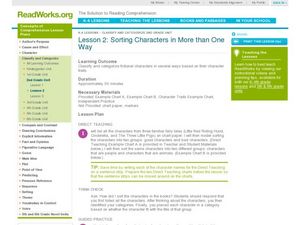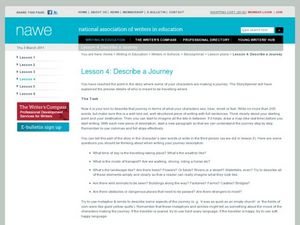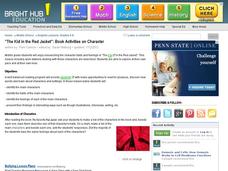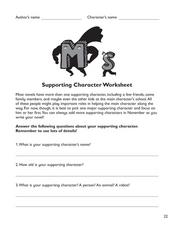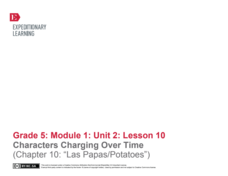Curated OER
Comic Book Characters
Explore gender stereotypes by analyzing how male and female characters are depicted in comic books. Using the provided Comic Book Analysis sheet, students record the attributes of male and female comic book characters. Then the whole...
Curated OER
Describing Characters with Rich Language
Second graders describe characters. In this describing characters lesson plan, 2nd graders dissect the text of a sample story and identify more descriptive words than those generally used. Students select their own character to describe...
Curated OER
Descriptive Writing Using the Book Rumpelstiltskin
Use the fairy tale Rumpelstiltskin to teach your third grade class about descriptive writing. Following a teacher read-aloud of the story, the class brainstorms a list of adjectives describing the main character. Students use this list...
Curated OER
Sorting Characters in More Than One Way
Introduce your class to characterization. Familiar story characters are sorted into "good" and "bad" categories based on the characters' personalites and actions in the story. The class discusses and describes characters they have read...
Classroom Adventures Program
Creating Characters
Examine character in depth. Over the course of these six lessons, learners explore their own character traits, determine the traits of characters in the books they read, practice comparing and contrasting, and collaborate in small groups...
Curated OER
The Landlady Pre-Reading: The Characters
Prepare your class to read "The Landlady" by Roald Dahl with these pre-reading activities about the two main characters in the story. This resource provides a brief overview of the story as well as excerpts from the text that describe...
Fluence Learning
Writing About Literature: Comparing and Contrasting Characters in Heidi
Scholars read excerpts from the story, Heidi, in a three-part assessment that focuses on comparing and contrasting characters. Each part contains three tasks that challenge learners to discuss, answer comprehension questions,...
Curated OER
Characterization
A 46-slide presentation focuses on ways to describe characters in stories, how to create story characters, and how to show a character's personality in a student-created story. The colorful and engaging slides provide lots of great ideas...
Curated OER
Describe a Journey
Learners describe the sensory experience of a character's journey in an essay. In this precise details writing lesson, students explain the effects on the senses of weather, time of day, landscape, and other experiences. Learners use...
Curated OER
Creating Characters
Students examine the methods of effective characterization. In this writing skills lesson, students discuss how emotions, dialogue, actions, and physical descriptions build believable characters. Students then use the methods of...
Curated OER
Noisy Nora, Studious Students: Story Elements
Alliterative adjective nicknames generate stories inspired by Rosemary Wells' book Noisy Nora (also a thematic complement to any class with children who make a ruckus to get attention). Class members explore basic story elements --...
Curated OER
A Boxful of Character
I can't wait to try this activity with my class. It's versatile and could be modified to fit any character analysis lesson. To analyze characters thoroughly, learners create life boxes. Each box will pertain to a character from any...
Curated OER
Letter Sound and Letter Combination Accuracy: Sound Matching Adjectives
Kindergartenrs explore English by analyzing images in a picture book. This lesson on the parts of speech calls for young learners to view a picture book in class and describe characters, settings and objects with adjectives. Then, as a...
Curated OER
Main Characters
In this main characters worksheet, learners describe one main character from the book in detail. Students then compare themselves to the main character from the book.
Roald Dahl
Matilda - The Weekly Test
Readers take the main characters in Matilda and individually describe them through a mnemonic. To get there, group members create an acrostic poem describing the character they were given, and choose one of the words from the acrostic...
Curated OER
Stir Up a Character Analysis Recipe
What ingredients make up a character? A cup of honesty, a dash of humor, a pinch of cynicism? Based on real cookbooks they review in class, learners at any grade level three and up write recipes to describe characters familiar to your...
Curated OER
Describing a Story Event or Character
First graders discuss story events and characters. In this story event or character lesson, 1st graders work in tiered groups to read George Ella Lyon's, Together. They complete reading the story before talking about their favorite...
Curated OER
Describe and Compare: Teacher Edition
Note: This is the teacher's guide to Pimsleur's French lesson called "Describe & Compare." The guide discusses the lesson's purpose, objectives, and designed learning outcomes. It presents information on each of the activities the...
Bright Hub Education
"The Kid in the Red Jacket": Book Activities
Learning stations aren't just for little ones; middle schoolers can have fun while learning about the main character in the book, The Kid in the Red Jacket. Outlined are three different activities that are completed as each small group...
Curated OER
Make Up Your Story
Putting together an interesting story can be hard, but this set of worksheets will guide your writers into the depths of their own creativity as they characterize both their main character and villain. Using humor to keep learners...
Curated OER
Supporting Character Worksheet
Where would Harry Potter be without Ron Weasley? Where would Holmes be without Watson? Where would a good narrative be without an interesting supporting character? Encourage character analysis with this resource, which includes six...
Curated OER
Out of the Dust: Background notes about the novel, The Great Depression, and The Dust Bowl
If your class is reading the historical fiction novel, Out of the Dust, then you are in luck. Here are a few slides that will help you provide historical context for the book, as well as define main characters, setting, symbolism, and...
Leading Learner
Using Music to Tell a Story or Describe a Scene
Young composers demonstrate their understanding of the stylistic features of descriptive music, including pitch, tempo, dynamics, rhythm, and timbre, by developing a melody and countermelody for a main character in a story. As part of...
EngageNY
Characters Changing Over Time (Chapter 10: "Las Papas/Potatos")
Engage further in Esperanza Rising with a focus on close reading and metaphor. Class members zero in on the tenth chapter, examining characters and big ideas. Pupils discuss the text in small groups and as a whole class, and participate...





